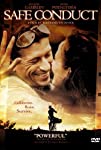Eye For Film >> Movies >> Safe Conduct (2001) Film Review
Safe Conduct
Reviewed by: Angus Wolfe Murray

During the occupation of Paris, the French film industry thrived. The only problem was that the Germans controlled the studios. Directors, scriptwriters, cinematographers, set designers and the rest had to make hard decisions - to work with the enemy, or not work at all.
Laissez-Passer translates as Safe Conduct, which doesn't immediately connect to anything going on here. This is an insider's movie. Nothing is explained. If you don't know the names of once-famous figures of the period, you may miss the nuances.

The script is based on Bertrand Tavernier's conversations with director Jean Devaivre and writer Jean Aurenche. Their stories are the central core of the movie, which is the cause of emotional dislocation as the camera switches from one to the other, at will. Although the two men inhabit the same milieu, they don't meet, except in passing, and their lives are very different.
Tavernier succeeds in recreating the conditions under which films were made in France in the early Forties. The German studio heads are portrayed, not as Philistines, but tough task masters. They want their projects brought in on time, within budget, while retaining the highest standards of artistic quality. Who doesn't? With Nazi secret police hovering and paranoia feeding off fear, this was almost guaranteed.
Devaivre (Jacques Gamblin), who finishes up as an assistant director, is happily married and a member of the Resistance, although you never quite know what he does. There is an odd incident when he flies to England, with an appalling cold, to be interrogated by ill-mannered British officers about certain papers he has stolen, the significance of which remains a mystery.
Aurenche (Denis Podalydes) is a typically restless writer, full of doubt and charm, brave words and soft options. He has no money, a couple of suitcases, one painting and three mistresses, all of whom adore him. He is sought after because of his talent, but agonises over whether to accept film work. He keeps dodging from one lady's apartment to another, scribbling away, intellectually torn and consistently afraid of being picked up by the Gestapo and sent to Germany.
By remaining true to the craft of compromise, whereby survival in the form of co-operation with an occupying force is considered necessary for the sake of cinema, Tavernier creates a picture without a frame. As an historic reconstruction of life amongst the movie crowd during Hitler's war, Laissez-Passer can hardly be faulted and yet, despite 170 minutes of screen time, it remains confused. When you want to know more about Aurenche, you are back with Devaivre, and vice versa.
In the end, all you can do is admire the ensemble players and wonder what the point of it is, except as a record of what might have happened between 1942 and 1943, when some films you've never heard of were made.
Reviewed on: 07 Nov 2002


















